He continued, “Fr. Ehusani approached us in March and by the end of September, the program was already running. It broke the record in terms of the speed of recognition, especially by the commission for university education.”
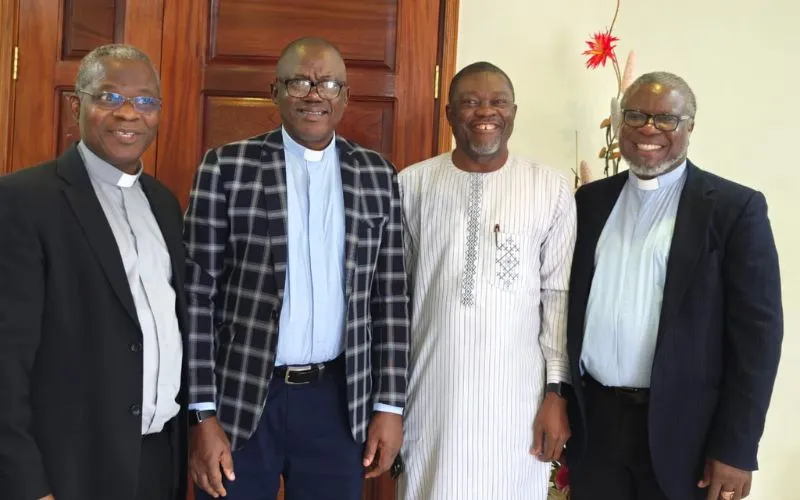 From Right to left: Fr Joyzy Egunjobi, Director, Nairobi Centre of PSI; Prof. Gabriel Egbe, Dean Faculty of Humanities, Veritas University Abuja, Rev Fr (Prof) Hyacinth Ichoku, VC Veritas University Abuja; and Fr George Ehusani, Executive Director, Lux Terra Leadership Foundation
From Right to left: Fr Joyzy Egunjobi, Director, Nairobi Centre of PSI; Prof. Gabriel Egbe, Dean Faculty of Humanities, Veritas University Abuja, Rev Fr (Prof) Hyacinth Ichoku, VC Veritas University Abuja; and Fr George Ehusani, Executive Director, Lux Terra Leadership Foundation
Fr. Hyacinth described the university’s affiliation with PSI as “a major addition” to what is offered at the Catholic institution of higher learning.
The PSI program ensures that it churns out “healed healers”, by combining academics with practical healing sessions of students enrolled in the program.
In the November 20 interview with ACI Africa, Fr. Ehusani emphasized the uniqueness of the program, saying, “Our training amounts to formation, not just academic knowledge.”
(Story continues below)
Explaining part of the program’s methodology, the Abuja-based Catholic Priest said, “Every week we have a day set aside for one-on-one counselling with a Spiritual Director, and another day for group therapy. We divide the class into groups of four and they meet every week to open up among each other and help themselves to grow.”
“It is unique,” the PSI founder and Executive Director of the Lux Terra Leadership Foundation said, and added, “It is different from going to pursue a master’s in psychology; It is about personal transformation.”
In Nairobi for instance, PSI students live together, eat together and learn together for two years. This way of living, Fr. Ehusani says, creates a bond among the students.
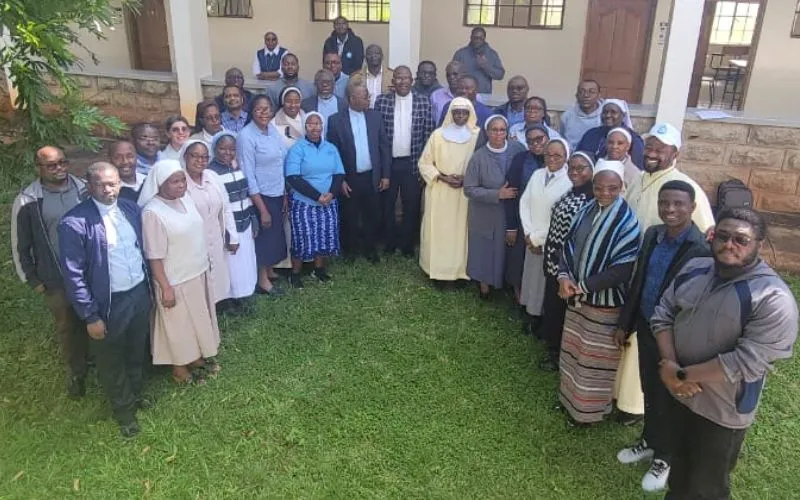 Fr. George Ehusani in a group photo with all the PSI students, outside their classrooms in Nairobi. Credit: Fr George Ehusani
Fr. George Ehusani in a group photo with all the PSI students, outside their classrooms in Nairobi. Credit: Fr George Ehusani
Since inception, PSI has so far produced nine sets of graduates from 27 African countries. This amounts to 180 graduates, who are working as trained spiritual counsellors in various Church institutions in and outside Africa.
In Nigeria, PSI opened its doors to its first group of 33 post-graduate diploma students and 12 Mater's students, who started their classes on September 30.
The 12 Mater's students pursuing Psycho-Spiritual Therapy include 10 Catholic Priests and two lay people. They are set to graduate in June 2026.
Meanwhile, the 33 post-graduate diploma in Psycho-Spiritual Trauma Healing students are all lay, except for one Priest and one woman Religious; the 33 are set to graduate in June 2025.
In the November 20 interview with ACI Africa, Fr. Ehusani reiterated the Veritas University VC’s sentiments, noting that the post-graduate diploma program “does not exist anywhere in Africa.”
“This is a postgraduate program equipping candidates with skills to heal,” he said, adding that the skills are imparted not just to Clergy and women and men Religious, but to a wide range of professionals, including medical doctors, social workers, emergency relief workers, schoolteachers, school-based counsellors, as well as Imams and Pastors.
Also accepted for the post-graduate diploma program are volunteers at camps for the internally displaced persons (IDPs) that have reportedly increased in Nigeria owing to the activities of jihadists and bandits.
Volunteers in prisons and in hospitals, as well as lawyers, policemen and women are also welcome to enrol in the program, Fr. Ehusani told ACI Africa, adding that “the program targets anyone who interacts with traumatized individuals.”
PSI was established in partnership with Missio Aachen “with the aim of training and graduating experts in Psycho-Spiritual Therapy and Counselling for African countries.”
Fr. Ehusani started it, first as a one-week certificate programme that was provided by the PSI of the Lux Terra Leadership Foundation for professionals and volunteers.
The program came in to fill the gap in trauma healing in Africa’s most populous nation that is witnessing a rise in trauma victims.
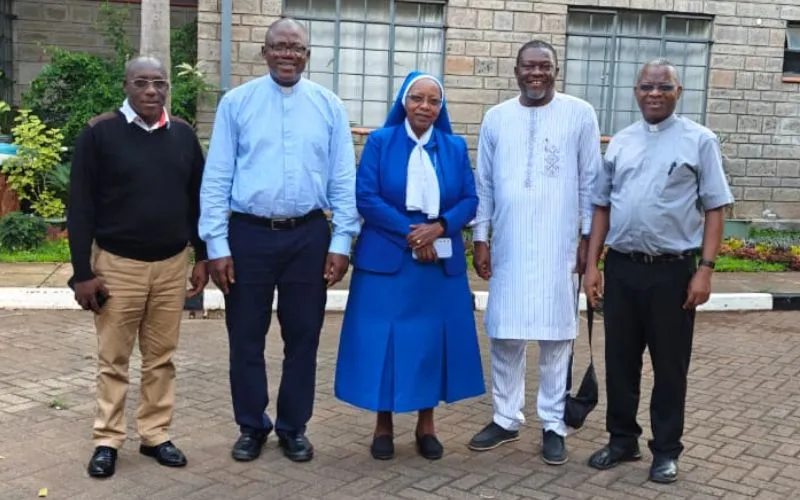 Visiting the Director at Chemi Chemi Centre. Credit: Fr. George Ehusani
Visiting the Director at Chemi Chemi Centre. Credit: Fr. George Ehusani
Violence is widespread in Nigeria, starting with the Northern and Middle Belt regions of the country that have, for several years, been experiencing outbreaks of high intensity violent conflicts, resulting in the death of thousands and displacement of millions of people.
In recent times, these violent conflicts have extended to the country’s Southwest, the Southeast and the Southsouth.
“Many of the persons who are direct or indirect victims or survivors of Boko Haram insurgency, the herdsmen banditry, the sporadic inter-ethnic and inter-religious conflicts, the widespread kidnapping for ransom, election related violence, and sundry criminality across the length and breadth of this country, have lived through extremely traumatic experiences,” Fr. Ehusani told ACI Africa.
He added, “Children have watched their fathers hacked to death or their mothers savagely raped in their presence. Many survivors have lost everything overnight – including their family members, their sources of livelihood, their homes and properties, and they are suddenly thrown into abject poverty and destitution.”
Others, the member of the Clergy of Nigeria’s Catholic Diocese of Lokoja recounted, have lost limbs and are now living with one disability or the other. Others, he observed, have been raped or have endured untold physical torture and psychological abuse.
“Indeed, the majority of Nigerians have been living through circumstances that are a moral equivalence of war,” Fr. Ehusani said.
His concern, he told ACI Africa, has been that though Nigeria has thousands of graduates of psychology, not many of these graduates are engaged in the counselling enterprise.
“Well trained and practicing specialist trauma counsellors are very few in Nigeria, whereas tens of millions of our countrymen and women as well as children are daily experiencing tragic events that overwhelm their capacity to cope, and therefore leaving them traumatized,” he said.
He continued, “These survivors of the many tragic events that have become a daily occurrence in our society, have often been abandoned to their own resources.”
According to Prof. Egbe, PSI aims to go back to the origins of Psychology, a field he says has been “diluted”.
“Psychology has been diluted to mean the study of the mind and human behaviour. But going back to the origins, that is not what psychology is. Psychology is about soul-curing. Psychology in itself can therefore not be divorced from religion,” Prof. Egbe said during the November 20 interview with ACI Africa.
He added, “Contemporary thinking seems to move psychology away from religion, and make it stand as an imperial science. This, for me, is reductionist.”
The Nigerian don explained how difficult it is to minister for one who does not understand the human person.
“From the Christian perspective, we see the human person as both body, mind, soul, and spirit. Taking away all those other components and treating one as just body and perhaps the mind makes psychology deficient,” he said
Prof. Egbe said that “what PSI is trying to achieve is to bring that integration so that when teaching psychology to students, you don’t teach it just from the imperial science perspective. You must bring in the mystical perspective, and to help the human person to find meaning in life.”
“Looking at the way things are going, even in Nigeria, you’ll see that very many people have lost purpose for life. People don’t know what life is all about. This is where the strength of PSI is,” he said.
The Nigerian Arts Professor went on to laud the PSI post-graduate program for being not just purely academic. He said, “The students themselves undergo a transformation through the practical one-on-one counselling and spiritual interactions. It is only after they are healed that they go out to heal others.”
He expressed optimism that the outcome of the first set of students at the Nigerian PSI campus will make a difference in the West African country.
Prof. Egbe observed that even though the PSI Masters program is heavily dependent on strong Catholic spirituality, the certificate program, which has been in existence for years is open to all faiths.
Expressing optimism that the master’s program evolves to cater for people of other faiths, the official at Veritas University said, “We hope that the program will be something that anyone can enrol in. Ultimately, we all must find meaning in life.”
“It is also important that those enrolled in the program educate themselves in the spiritualities of other faiths so that when a Muslim comes to you for psycho-spiritual trauma healing, for instance, you are able to be of assistance to them,” he said.
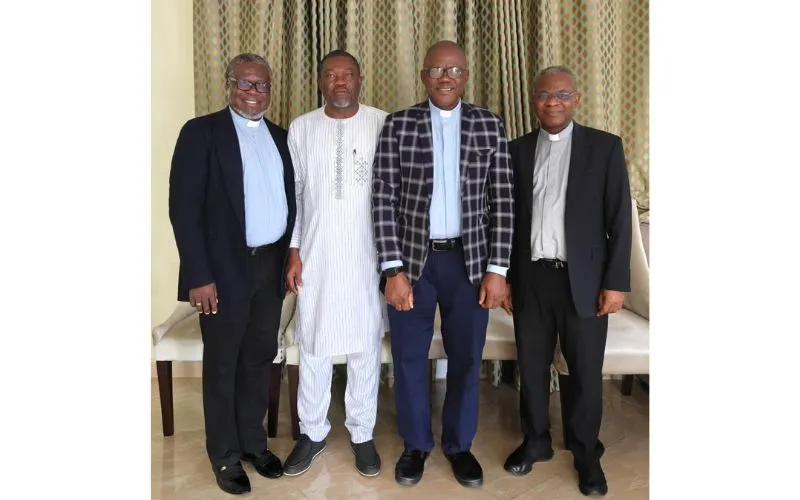 From Left to right: Fr. Joyzy Egunjobi, Director, Nairobi Centre of PSI; Prof. Gabriel Egbe, Dean Faculty of Humanities, Veritas University Abuja, Rev Fr (Prof) Hyacinth Ichoku, VC Veritas University Abuja; and Fr George Ehusani, Executive Director, Lux Terra Leadership Foundation during a visit to PSI campus in Nairobi. Credit: ACI Africa
From Left to right: Fr. Joyzy Egunjobi, Director, Nairobi Centre of PSI; Prof. Gabriel Egbe, Dean Faculty of Humanities, Veritas University Abuja, Rev Fr (Prof) Hyacinth Ichoku, VC Veritas University Abuja; and Fr George Ehusani, Executive Director, Lux Terra Leadership Foundation during a visit to PSI campus in Nairobi. Credit: ACI Africa
In the November 20 interview, Fr. Ehusani told ACI Africa that the post-graduate diploma course is a one-year hybrid program that will be extended to candidates across Africa.
Those enrolled in PSI’s post-graduate diploma program will only need two weeks of residency. They will choose to go to Nigeria or Kenya for the two weeks set aside for their final exam and a healing session, he said.
Fr. Ehusani also said that the post-graduate qualifies one to join the Maters program. Alternatively, one’s first degree must be in Philosophy, Theology, Scripture, Anthropology or related humanities to enrol for the master’s program.
Future plans for PSI include offering the PhD at the institute, Fr. Ehusani said.
He explained, “In about three years, we hope to start offering a PhD program to allow for specialization in different areas such as trauma healing, grief therapy, addiction, depression, and so on.”
“We want to have specializations to train real experts and allow for serious research in this field,” the PSI founder and Executive Director of Lux Terra Leadership Foundation told ACI Africa in Nairobi on November 20.
Agnes Aineah is a Kenyan journalist with a background in digital and newspaper reporting. She holds a Master of Arts in Digital Journalism from the Aga Khan University, Graduate School of Media and Communications and a Bachelor's Degree in Linguistics, Media and Communications from Kenya's Moi University. Agnes currently serves as a journalist for ACI Africa.



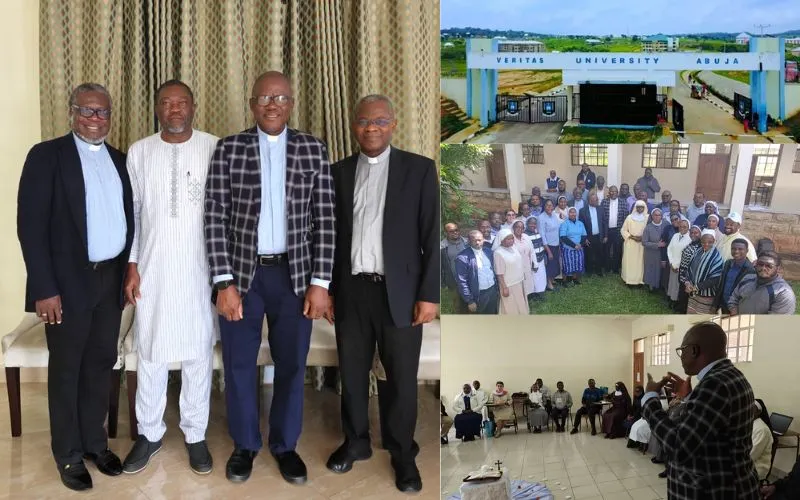
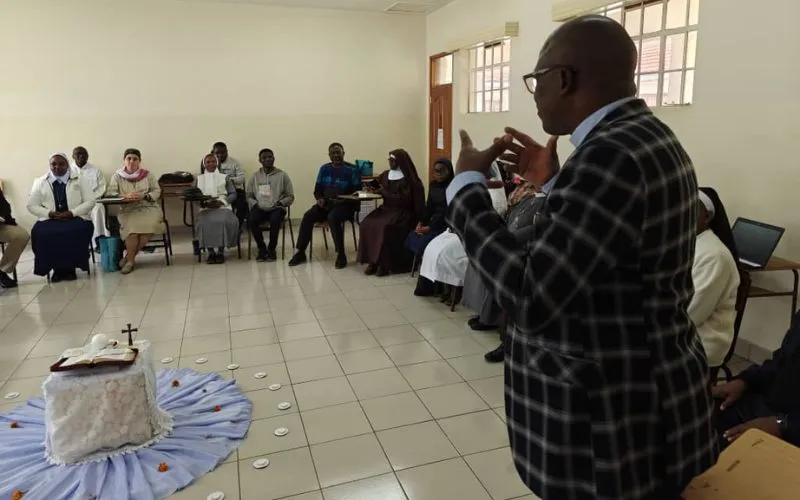 The visiting VC addressing the PSI students in class. Credit: Fr. George Ehusani
The visiting VC addressing the PSI students in class. Credit: Fr. George Ehusani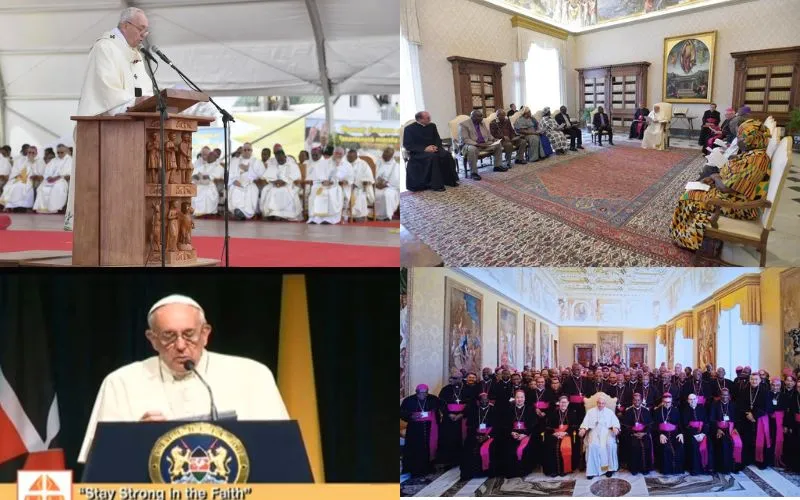
 From Right to left: Fr Joyzy Egunjobi, Director, Nairobi Centre of PSI; Prof. Gabriel Egbe, Dean Faculty of Humanities, Veritas University Abuja, Rev Fr (Prof) Hyacinth Ichoku, VC Veritas University Abuja; and Fr George Ehusani, Executive Director, Lux Terra Leadership Foundation
From Right to left: Fr Joyzy Egunjobi, Director, Nairobi Centre of PSI; Prof. Gabriel Egbe, Dean Faculty of Humanities, Veritas University Abuja, Rev Fr (Prof) Hyacinth Ichoku, VC Veritas University Abuja; and Fr George Ehusani, Executive Director, Lux Terra Leadership Foundation Fr. George Ehusani in a group photo with all the PSI students, outside their classrooms in Nairobi. Credit: Fr George Ehusani
Fr. George Ehusani in a group photo with all the PSI students, outside their classrooms in Nairobi. Credit: Fr George Ehusani Visiting the Director at Chemi Chemi Centre. Credit: Fr. George Ehusani
Visiting the Director at Chemi Chemi Centre. Credit: Fr. George Ehusani From Left to right: Fr. Joyzy Egunjobi, Director, Nairobi Centre of PSI; Prof. Gabriel Egbe, Dean Faculty of Humanities, Veritas University Abuja, Rev Fr (Prof) Hyacinth Ichoku, VC Veritas University Abuja; and Fr George Ehusani, Executive Director, Lux Terra Leadership Foundation during a visit to PSI campus in Nairobi. Credit: ACI Africa
From Left to right: Fr. Joyzy Egunjobi, Director, Nairobi Centre of PSI; Prof. Gabriel Egbe, Dean Faculty of Humanities, Veritas University Abuja, Rev Fr (Prof) Hyacinth Ichoku, VC Veritas University Abuja; and Fr George Ehusani, Executive Director, Lux Terra Leadership Foundation during a visit to PSI campus in Nairobi. Credit: ACI Africa


